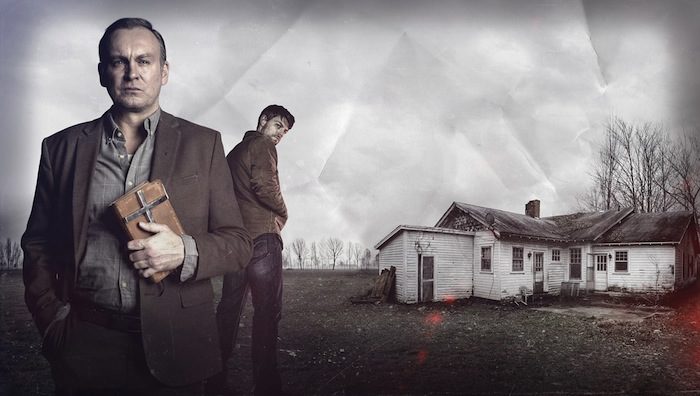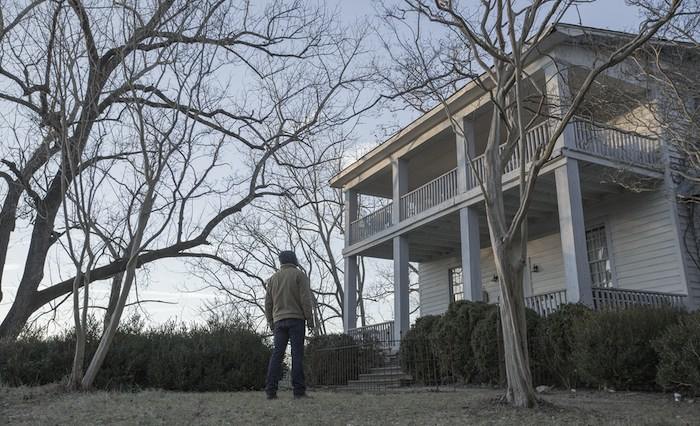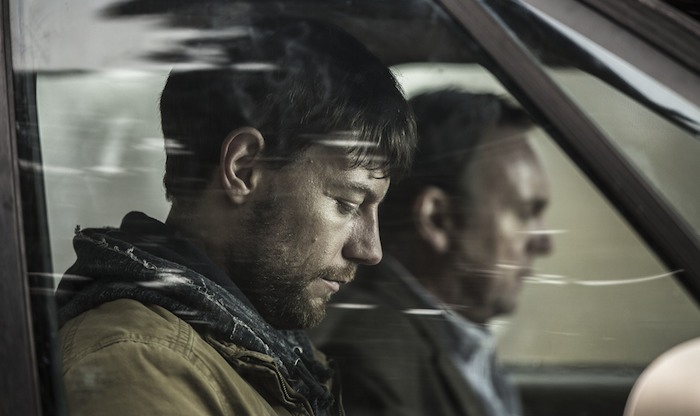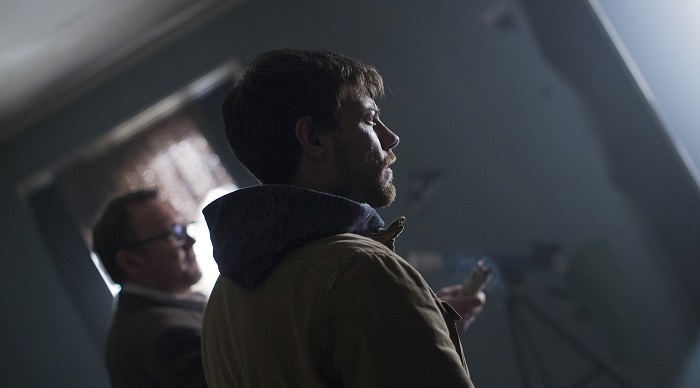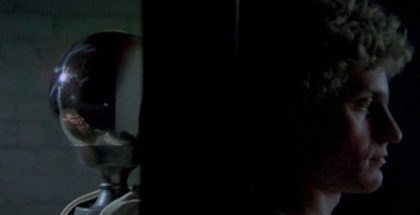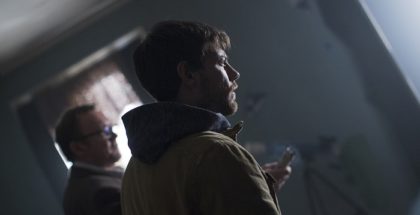Interview: Patrick Fugit and Philip Glenister talk FOX UK’s TV show Outcast
Matthew Turner | On 05, Jun 2016
Fox’s new series, Outcast, begins in the UK this week. Based on the Skybound/Image comic title by The Walking Dead creator Robert Kirkman and artist Paul Azaceta, the series follows Kyle (Patrick Fugit), a man who has been plagued by demonic possession all his life. With the help of Reverend Anderson (Philip Glenister), he embarks on a journey to find answers to obtain a normal life.
Outcast premieres in the UK on FOX at 10pm on Tuesday 7th June. Can’t wait until then? You can already catch the first episode on-demand through NOW, Sky’s VOD service.
We sat around a table with Patrick Fugit and Philip Glenister, who told us about the show.
What attracted you to the roles, first of all?
Patrick Fugit: I was looking for work (laughs). I got sent the initial audition and Robert Kirkman’s name was attached to it and he’s done some cool things with television and that sort of thing, so that was exciting. Chris Black, our show-runner, we had worked together on a pilot that didn’t get picked up a couple years ago and it just seemed like a cool creative team to get in and experiment with.
Philip Glenister: For me, it was the first foray into an American TV show, which I never really envisioned myself doing, it wasn’t something that I thought too much about, so when I was asked to put myself on tape for it, I did it just with that kind of [shrugs], yeah, you know, thinking I’d never hear sight nor sound of it, ever. And then they came back and said they would like you and they’re very interested and I’m like, ‘Really?’ And so that’s sort of how it came about, and then I flew to L.A. to meet with Patrick and Gabriel, who plays Joshua, for like a chemistry test, to see if we all got on and didn’t hate each other, and then after that they came back and said, ‘We want you to do it’, so it was like, ‘Oh. Okay!’
Philip, your American accent is very impressive. How did you work on that?
Philip Glenister: Thank you! It’s not my first, but it’s a lot easier staying in an American accent when you’re surrounded by Americans than when you’re playing an American in the middle of fucking Bermondsey, surrounded by southeast Londoners going [does southeast London accent], ‘Awight Phil, how ya doin’, geezer?’ ‘I’m tryin’ to fuckin’ be an American here, man!’ We all had to sound pretty similar, so we had a great dialect coach who came down and basically just went through the scripts with all of us, so we all sounded like we were from vaguely the same town. And I just stayed in the accent when I was out there and it was kind of fun, [adopts American accent], doin’ mah shoppin’, y’all are gonna have a great day today. Obviously, when my family were there I didn’t stay in it, but I got the kids to do it in the supermarket once! When we were in Charlotte (North Carolina), I said, ‘Come on, let’s be American’ and they were like ‘Okay, dad’, and they were at one end of an aisle and I said, ‘Go on, shout out to Mom’, and they were like, ‘MOM! MOM!’ and she was like, [does exasperated British accent], ‘WHAT?’ So it was quite fun.
Apparently you taught Patrick some English swear words. Is that true?
Patrick Fugit [adopts Northern accent, sounds like Sean Bean]: Northern swear words.
Philip Glenister: Northern swear words. Christ on a bike.
Patrick Fugit: Christ on a bike, fookin’ bag o’ shite.
Philip Glenister: Bag o’ shite. Yeah. Did quite a bit of that. But Patrick’s a big fan of British comedy. It’s amazing, the American actors you work with who really love the British sense of humour and know so many of the comedians and stuff, so that’s kind of fun.
Patrick Fugit. I grew up really loving Monty Python. My best friend and I, we were all about the albums and the films, particularly The Holy Grail, which was our favourite one. And then I got into Eddie Izzard as I got a little older and Phil introduced me – didn’t you introduce me to The Fast Show?
Philip Glenister: Yeah. Deaf stuntman. Fawlty Towers, did you ever get round to Fawlty Towers?
Patrick Fugit. No, I didn’t.
Philip Glenister: See, I was so jealous, I was like, my God you’ve never seen Fawlty Towers! I’m really envious that you’ve never seen it, you can see it for the first time.
Can you talk a little about the journey of your characters through the season? We’ve seen up to the end of Episode 4.
Patrick Fugit: I really like the end of episode four.
Philip Glenister: I haven’t seen it – what happens? What do I do? [Puts on luvvie accent] Am I mar-vellous?
Patrick Fugit: [puts on silly voice] ‘Oh, you’re brilliant!’
Philip Glenister: That’s what we used to do on set. [puts on same silly voice, high-pitched, excitable, Northern] Oh, brilliant, we’re going to work until four o’clock in the morning on Saturday, it’s gonna be brilliant! Yeah, they want us to do our own stunts today, Patrick and make us lie in mud and get really freezing cold, brilliant!
Patrick Fugit: So, my character, Kyle, starts off in a sort of isolated dark space and I think, through the course of the season, he starts to link up with the Reverend [Glenister’s character], though they have opposing views of what’s going on and opposing approaches, which causes some tension but I think Kyle’s starting to figure out that he can actually have a say in what’s going on around him, sort of control his destiny, in a way but there’s a lot of stuff to explore, questions to be answered, that sort of thing. I can’t give too much away… .
Philip Glenister: I think, obviously, the Reverend is a complex creature, he’s obviously the big fish in the small pond in many respects, and what’s fascinating for me is the complexity of the man, he’s kind of a broken man inside, in many respects, he calls himself a soldier of God at the expense of having a estranged wife and son, who he’s sort of passed over for this cause, and, as we see during the course of the series, Kyle comes back into his life with this touch that he’s been sort of working on all his life, and he seems to have – it’s like the new kid on the block, sort of thing, taking over from the old guard, and there’s kind of a resentment and an envy and a jealousy that kind of spills out, which says a lot more about the Reverend’s place, but during the course of the series, we see that the two of them need each other.
What kind of research did you do?
Philip Glenister: I didn’t, really. I’m not a big one on research. I mean, people said, ‘Did you watch lots of exorcisms on YouTube?’, and I was like, ‘No’. They were like, ‘Did you watch The Exorcist?’ and I was like, ‘No’. But I did watch some of these TV evangelists on the American station, which are absolutely fucking riveting. I mean, the real deal [adopts thick American accent again, growls like Elvis], some guys, they’re real kind of out there and ‘I’m gonna heal, oh mah God, I’m feeling it come through me now’ [drops back into own accent] and you’re like, ‘Shit’. And there was this one guy, I think he was a local guy in Charlotte, one Sunday morning, and me and the missus are in bed and we stick the telly on – we’re in the middle of filming and I had a big sermon scene to do in Episode 2, that week, coming up, so I was watching and it was great, it was almost like an epiphany, it was meant to be, and this young guy, he’s like a rock star, he’s like a member of One Direction, he’s got ripped jeans and he’s got the microphone and he’s on the edge of the stage and he’s kind of giving it, [adopts American accent again] ‘Hey man’, and he said, ‘Brian, you’re going to be Adam, Natasha, you’re going to be Eve, now come up on stage, guys’, now, what’s the purpose behind this?’ And everyone is like this [does jaw-dropping face], and I’m like, ‘Fuck, this guy’s good’. So we’re watching all this going on and it clicked, it was like, ‘He’s a rock star, he’s a rock star’. So when we were shooting the scene in the church with Howard Deutch, our director, I remember running in and going, ‘Howie, Howie! I’ve had an epiphany!’ and he was like, ‘What’s the fucking English guy on about?’ and I said it would be great if rather than being stuck behind the pulpit, to use the whole walkway down with the church and with the congregation and just go for it and see what happens. And he said absolutely, we’ll set it on a crane and do a big wide mast and he said, ‘Do you want to rehearse?’, and I said, ‘No, let’s just go for it, I screw up I’ll just start again or pick it up and let’s just go for it and see what the reaction is from the flock and the supporting artists. So we did it and we went right through – there were a few little hiccups, but we got through it and I remember people started clapping and then this little old lady grabbed the back of my chair and she looked at me and she went, ‘I’m converted!’ And I was like, ‘Woah! Boom! We’re off!’ So that was my way into the character. Sorry, that was a bit of a long-winded one.
So I take it there was no intimidation you felt from the source material, it being controversial and a subject so close to people’s faiths?
Philip Glenister: Well, you know, I mean, what do you do? Say no? Just ignore it? It’s a TV show at the end of the day, it’s a drama. I respect people who have a faith, but I equally respect people, probably more, who don’t have a faith. I mean, I’m not religious person, particularly. I believe in spirituality and being a decent-ish person up to a point, you know, don’t go around shooting people or anything. But I won’t be told by any religion what I should think and what I should do and what I can and can’t do, quite frankly, you know?
What makes Outcast different from other shows on TV?
Patrick Fugit: I think, like with the zombie genre, there had been a lot of different films and perspectives that had come out about it and then Robert Kirkman came out with The Walking Dead and this idea that it’s like just a never-ending Zombie Apocalypse story about these characters – he’s taking basically a horror genre and making it character-driven and then changing the way that we look at the zombies and the rules of that world, and I think he’s doing the same thing here with possession. We’ve got possession genre films that we’ve seen, and that we know, we know the tropes, they feel pretty familiar when you watch more recent possession stories and compare them to like The Exorcist and all the possession films, stuff like that, but what Robert’s good at is changing the rules and changing the perspective and also playing off those familiar possession movie tropes to sort of make it feel familiar before he changes what’s going to happen. I know Robert has been concentrated a lot in terms of developing the story – he wants it to feel like these guys are trying to look at the bigger picture – like The Exorcist is all centred around that one exorcism and then when the demon is out of the girl it’s like, ‘Ah, there we go – that’s the end of that’ and I think with Outcast he wants it to be like, ‘Well what happens to the next person and how do we stop it from continuing? What happens before, what happens after, what happens to the person afterwards?’ and that sort of thing.
Did you read the comics before you started filming? Did you find that helpful?
Patrick Fugit: There were, I think, five or six issues out by the time we started doing auditions and stuff like that, so I read those to get a sort of idea of the tone and really kind of like the physicality, like what Robert [Kirkman] and [artist] Paul Azaceta were using in terms of panels, to communicate, like what the sort of visual language of the series was going to be, that sort of thing. But once we started filming, the scripts have an opportunity for a lot more texture in them because there’s so many more tools that we have at our disposal, than you have when you’re writing an issue of a comic.
Philip Glenister: They were kind of a built-in storyboard for the crew, in many respects, for the camera and director. What we used to do was you take it off the page, whether it’s a comic book or the script.
Did anything creepy happen while you were shooting?
Patrick Fugit: We had some people put up signs on their garages saying, “Outcast is going to bring the devil to Chester”.
Philip Glenister: They also had signs saying “Vote Trump”, which was a bit of a clue.
Where was it filmed?
Patrick Fugit: This was in South Carolina.
Philip Glenister: Rock Hill. Rock Thrill, we used to call it. And Chester was the town that doubled for Rome.
Obviously a different Chester to the one we have…
Philip Glenister: And a very different Rome to the one they have, yes.
What were the biggest sacrifices you both made for the special effects or stunts?
Philip Glenister: Biggest sacrifice? Not using my stunt double more! Duke, my stunt double was called Duke. He looked a bit like Daniel Craig and I thought, if I can just get him to act, I could just sneak off to Pinehurst for the weekend and play golf… I’m working on it. Season 2.
Patrick Fugit: We ended up doing a lot of stuff. We had a really great stunt team, but the directors would always want to put the cameras so that they could see our faces, so we’d end up in the pads, like breaking through glass or falling –
Philip Glenister: Denting the Reverend’s car…
Patrick Fugit: Yeah, falling on the car. There’s a great sequence where, like Phil was talking about, it was cold and rainy, it had been raining for two days and we ended up having to be on the ground in the mud and everything. We were sitting there [starts laughing], it was towards the end of shooting, somebody was holding an umbrella over us so that our faces and hair weren’t wet and we were just sort of laying on the ground like this and we’re about to explode into this whole thing – as soon as they call action, we’re going to go crazy. We were just sitting here, we were like, three days we were going to be home, and I think we were looking at each other like –
Philip Glenister: [sings] Hi-diddle-dee-dee, an actor’s life for me! Yeah.
How do you go about punching a child in the face on camera?
Philip Glenister: [laughs]
Patrick Fugit: Logistically, it’s tough, because if I really punch him, we get in trouble. Little Gabriel, who plays Joshua was an animal, an absolute terror.
Philip Glenister: Ran fucking rings round us, didn’t he?
Patrick Fugit: Yeah. I felt like, man, I gotta keep up with this kid. We shot that sequence over two days, it was really physical, all the levitation stuff was like different kinds of rigs where we had to be getting in and out of harnesses and stuff like that and he was a pro, man, he committed a hundred per cent every take. We had a stunt performer who was a woman and was kind of around the same height as him, so a lot of the really physical stuff is either her and myself or my stunt double and her, but that’s obviously like a crazy thing to do, to beat up a 10 year old.
Philip Glenister: The point is, no ten year olds were harmed in the making of this production! That’s a fact!
Your central relationship is important to the series, but it also seems like you get along brilliantly in person. Did you know each other beforehand?
Philip Glenister: Well I knew Patrick, obviously, as everybody does, from Almost Famous and then when I saw him, I was like, ‘Oh my gosh, he’s grown’ [laughs]. But no, I’d never met him before and then I just went out to the States and that was the first time we met. And he was very kind, he gave me a lift back to my hotel. So I said, ‘Oh, we’ll get on. I’ll just use him as a cab…’.
Patrick Fugit: Yeah, I think the first episode, we were both – the accent thing was tricky, because they wanted us to have a southern accent, so in the audition, I was just like, oh, I’ll just do like a general southern accent, so I did a southern accent and then they were like, ‘Okay, we want to dial it back’ – they were sort of one foot in, one foot out on the accent. So the first episode, we’re like kind of going for it and then kind of not going for it and I think we spent a lot of time getting the lines down, we were out in rural areas and there were nights where it was really very cold and any time we got in the Reverend’s car, it was like the stench was incredible. I don’t know where they got that car, like they’d picked it up in some automobile graveyard or something like that and somebody had been like murdered in it or something. It was terrible, so we had a good amount of hardships to bond over.
Philip Glenister: Yeah. And we stayed at the Rock Garden Hilton for three fucking weeks. I remember, because Patrick was filming more days than me and I used to go this place called Chilli’s over the road. And we filmed the pilot just before Christmas 2014 and I used to go over to this bloody Chilli’s, because there was nowhere else to go, so I’d go over there and sit there at the bar watching sport and this woman would be like, [adopts southern American accent], ‘You have a great day now, you hear, you have a great Christmas!’ and I said [still in accent], ‘Honey, I’m going nowhere’. And I go back in two days later and she goes, [accent again]. ‘Now you have yourself a great Christmas’, I say, ‘I’m still goin’ nowhere, baby’ and then one time, I was watching the Premiership, football, and she switched over and I went [London accent], ‘Oi! Can you switch that back?’ and she gave me this look, like, ‘What the fuck?’
You dropped the accent for that?
Philip Glenister: I dropped it, yeah, as soon as my boys were taken away from me, for the bleeding Rock Hill Thrillers or whatever they were called, I don’t know.
What was it like to work with different directors?
Patrick Fugit: I’ve never done that before – most of my experience is in film. I sort of felt bad for them as they came in, because they have like a few days to prepare, they’re like paratroopers, they jump into unknown territory, they have to get used to the way that the cinematographer likes to work, they have to meet and get along with us and they have to get the landscape of the show and figure out what kind of cinematic language they’re going to use and that sort of thing, so it’s a tough job but for the most part, it worked out.
Philip Glenister: Yeah, I mean, I think you just have to be adaptable, as they have to be adaptable, as you do, to the way they work and some are quicker than others and some are much slower and you just get an instinct – I mean, I’m used to working with more than one director because, doing TV shows, they tend to get a block and do two episodes each or something, and everybody brings their own personality and character to their shoot basically, so you just have to be adaptable and if things are going a little too off-kilter, or if they’re trying to force your character somewhere and you’ve been playing it for a bit, then you sort of say, ‘No’. ‘No, I’ll do it with a look’.
Did any of the directors stand out, particularly?
Patrick Fugit: Trish was great. Trish was able to get into – Phil liked Trish because she was quick.
Philip Glenister: She didn’t mess around. She had a Nike advert to go to, for Christ’s sake – I’d be quick if I had a Nike advert to go to.
Patrick Fugit: Yeah, she jumped in and was able to really, like –
Philip Glenister: Well, she knew what she wanted. She had experience.
Patrick Fugit: Yeah, she knew what she wanted and we didn’t do a lot of takes if she felt like she had what she needed and that sort of thing. And she also built a lot of momentum, like she knew exactly where she wanted everything to happen in terms of actor placement and camera placement and that sort of thing, but she also listened to the cinematographer quite a bit.
Outcast starts on Tuesday 7th June at 10pm on FOX UK. FOX UK is available on Sky, Virgin Media, TalkTalk, BT and UPC. Don’t have Sky? You can also stream it live and on-demand on NOW, Sky’s contract-free VOD service, for £6.99 a month. Episode 1 is available to watch now.
All photos: (C) Fox International Studios. All Rights Reserved.


